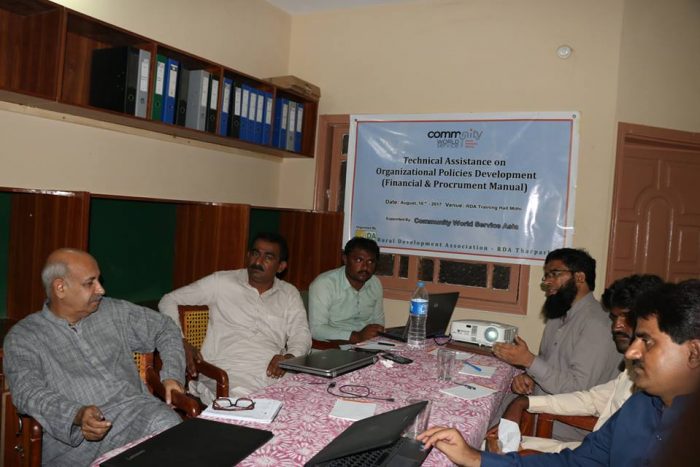Equipping grassroot organizations with essential capacity building to improve Financial Management systems
The training helped my organization to better understand methods of budgeting and keeping financial records. It also gave us the competence to develop sound and applicable financial policies for our work,
Muhammad Bakhsh Khaskheli, from the Rural Development Association (RDA) participated in a financial management training organized by Community World Service Asia in Mirpurkhas in May this year. The objective of the financial management training was to increase the financial management capacity and improve policy development of local community-based organizations. Kashkheli particularly sought after these improvements for his organization.
Our financial procedures were not that swift, and we had to work hard on assembling documents, making photocopies, and preparing missing formats for going through the annual audits. Moreover, we do not have an internal audit department, so an internal audit committee consisting of three executive body members did our internal monitoring. However, this committee was not competent to conduct an internal audit that provides insight on future planning and procedural intricacies.
A resident of Hyderabad city, 42-year-old Muhammad Khaskheli works as a program manager in RDA. Khaskheli’s primary responsibilities include program development, implementation, and resource mobilization. He is also responsible for corresponding with donors.
Khaskheli attended the Financial Management training, expecting that it would help improve and develop RDA’s financial management system. Various topics were covered in the training, such as financial planning, bookkeeping, and accounting. Khaskheli remarked,
The session on accounting taught us to base accounting on the principles of consistency, accountability, transparency, viability, integrity, stewardship, and accounting standards. The session was highly interactive. For each principle, the participants shared examples on how to harmonize accounting with these principles.
Khaskheli gained valuable information and tools at this training, which he introduced at his organization in order to improve their financial management. After the training, RDA developed updated financial management and Human Resources’ manuals. Community World Service Asia outsourced a consultant, who visited Khaskheli’s office, discussed and reviewed every policy and procedure in the updated manuals, before finalizing it, and then a held a one-day workshop with the staff to orient them on it. The consultant also supported RDA with developing specific policies in the newly revised manuals.
Khaskheli affirmed.Before this training, we had a very simple manual, but we were not able to develop a clear financial management system. However, these revised manuals’ detailed policies and procedures have positively affected the organization’s financial management in different ways,
Our financial procedures have improved since the training. Now, we have a better financial policy system and our documentation is complete and updated, ready for audits.
According to updated policy, the organization will hire a professional consultant to lead the internal audit committee and provide reports that will help in identifying policy and procedural gaps that are beneficial for future planning. This will continue until RDA attains resources to develop an independent audit department. After the training, RDA developed procedures to minimize financial risks. A code of conduct was also incorporated within the finance and administration departments and a clear delegation of authority was planned.
The training led to profound changes in the organization’s budgeting techniques. According to Khaskheli,
budget reporting has become easy.” At RDA, budget reports only included numerical figures before, now however, they include proper budget codes and budget narratives where necessary so that external stakeholder can easily understand the budgets. Khaskheli attested, “Because of the training, we better understand how to prepare budgets through an accountable and transparent financial system.
Adding further, Kashkheli stated,
Rural Development Association is a growing grassroots organization. We needed to develop a robust financial management system to make our financial matters transparent, easily functional, and to increase our credibility among the communities we are working with and other stakeholders, including donors.







